Jeddah, Nov 18: Heavy rains and wind lashed Jeddah and other parts of the country on Tuesday, causing the death of eight people, flooding of streets and underpasses, uprooting of trees, and widespread power cuts.
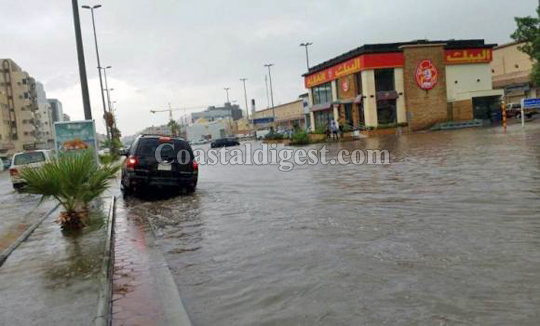
Two people died in the Faisaliyah district when they were electrocuted while clinging to an electric lamppost in a flooded street, while two others were injured, according to reports.
In Hail, the body of a child was pulled out of Wadi Bida bin Khalaf, said Maj. Nafi Al-Harbi, spokesman of the Civil Defense in the region. He said a team of divers found the body, while a search is underway for another child. The two children are brothers, aged 9 and 12. A Sudanese child was also rescued in the same valley.
In Yanbu, the Civil Defense divers recovered the bodies of five people, including two children, from flooded areas in Al-Bathna village. A search for another person is underway in Wadi Al-Jafr, 40 km away from Madinah, according to a report quoting Col. Khaled Mubarak Al-Johani, spokesman of Civil Defense in Madinah.
King Abdul Aziz International Airport issued a statement saying that eight domestic flights were delayed because of the inclement weather. One international flight was diverted to Madinah.
With the Presidency of Meteorology and Environment predicting further bad weather until the end of the week, Education Minister Azzam Al-Dakhil announced that schools in Jeddah would remain closed on Wednesday.
International Indian School-Jeddah Principal Syed Masood Ahmad confirmed that Wednesday would be a holiday and had informed students via text messages. Pakistani International School in Jeddah’s Aziziah district has announced it would be closed on Wednesday and Thursday.
Many underpasses were flooded prompting the authorities to shut them. A number of Saudis and expatriates were seen in the streets and alleyways pushing their vehicles out of knee-deep water. Some broken down vehicles whose engines had taken water had been left on the roadsides.
According to a Civil Defense statement, nearly 3,000 calls were made to the rescue teams from distressed people. There were 11 reported cases of trees being uprooted and billboards crashing down on main streets.
The timely forecast of bad weather on Monday, that resulted in the Education Ministry announcing schools’ suspension on Tuesday, was praised by parents.
“The saying, being forewarned is forearmed, turned out to be a big blessing on Tuesday,” said Muneer Al-Abyad, a graduate student at King Abdul Aziz University.
“I remember the horrible tragedy of 2009 when I was caught in a street with my family. We had no rain forecast then and we weren’t prepared for the deluge that caused such havoc.”
As the rains pounded the city, emergency response crews advised residents to stay indoors and to avoid underpasses. There were repeated announcements from mosques during Dhuhr prayers urging the faithful to pray at home.
In some districts, the situation was compounded by power cuts. The Jeddah municipality, through its social media account, said there were waterlogged roads and tunnels because of the machines that pump out water were not functioning because of lack of power. It said there was no electricity at pumps installed at seven tunnels in various localities of Jeddah. The Saudi Electricity Co. (SEC) stated on Tuesday that there were widespread power cuts in the Western and Eastern Regions because of the heavy rain and flooding. Technicians were working to restore the power, but would wait for assistance from the Civil Defense and other government agencies because some areas were inaccessible because of the heavy flooding.
According to the information issued for motorists, there was heavy flooding in Palestine Street, Prince Majed Street underpass, Sari Street at the junction of King Fahd Road, Tahliya Street, Naseem district, Kilo 14 and Kilo 11.
Roads that were closed included Naseem Street, Arabaeen Street, King Fahd Road in front of Souk Bawadi, Palestine Street at the junction of Madinah Road, Jeddah-Makkah highway, Sheikh Mohammed bin Jabir Street and Sabaeen Street at the intersection of Gharnata and Quraish streets.
While many were struggling on the flooded roads and streets, others, mostly children, were excited and making merry in the showers, like Munawwar Ansari, a student at Pakistani International School in Aziziah.
“The schools are closed and it is a day of fun for us,” exclaimed an excited Ansari, as he splashed his feet in the street water along with a group of friends in Jeddah’s Mushrefah district.
The streets in Aziziah, especially where most of the popular Pakistani restaurants are located, were flooded and at one point the rising water nearly lifted the vehicles. They bobbed on the water like boats in the sea.
In Rawdah district, the scene was no different. But because of construction activity and digging, the rain water had an outlet. “The area of the roads that were dug for laying pipelines were turned into water canals,” said R.T., a Filipino national.
“That turned out to be a blessing otherwise the standing and rising water would have created more havoc,” he said. The Filipino national said he woke up to find his carpet in his ground floor flat covered with water.
Jeddah received 22 mm on Tuesday morning. That is far less than the 90 mm rainfall on that fatal day in November 2009. Heavier rains fell in the northwestern city of Tabuk, near Jordan, where 46 mm were recorded since Monday, said Hussein Al-Qahtani, spokesman of the PME.
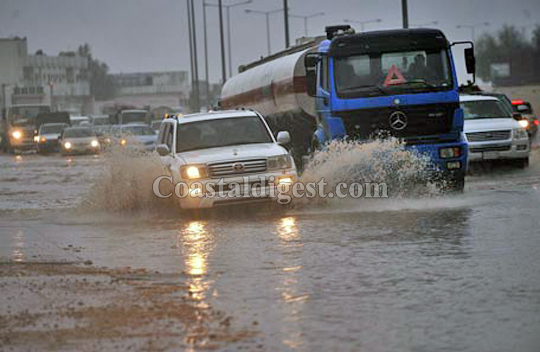
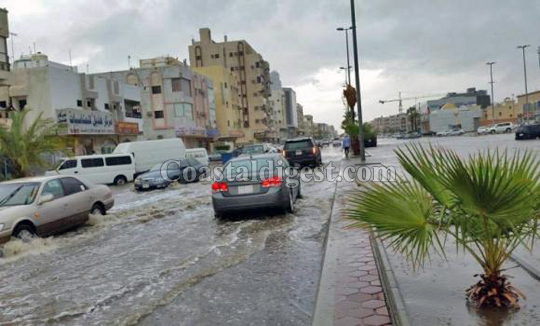
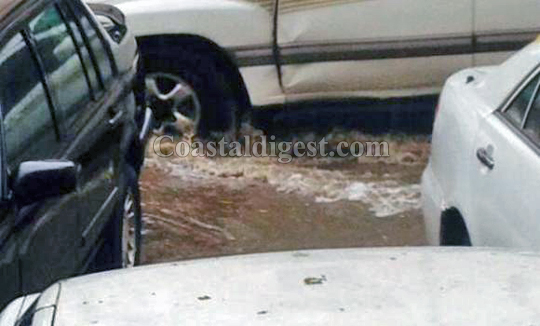
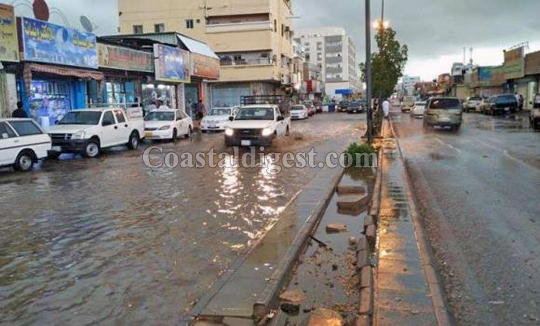
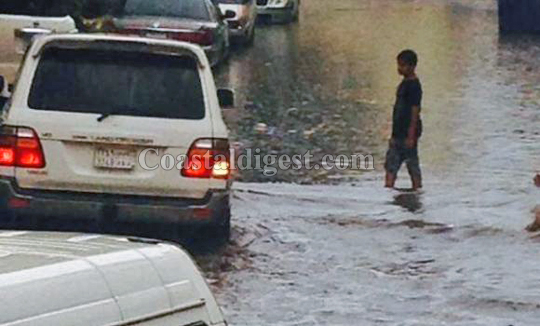




Comments
Add new comment